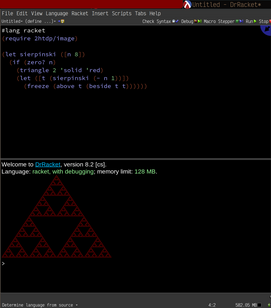
A programming language is a formal language comprising a set of strings that produce various kinds of machine code output. Programming languages are one kind of computer language, and are used in computer programming to implement algorithms.

Design by contract (DbC), also known as contract programming, programming by contract and design-by-contract programming, is an approach for designing software.
Operational semantics is a category of formal programming language semantics in which certain desired properties of a program, such as correctness, safety or security, are verified by constructing proofs from logical statements about its execution and procedures, rather than by attaching mathematical meanings to its terms. Operational semantics are classified in two categories: structural operational semantics formally describe how the individual steps of a computation take place in a computer-based system; by opposition natural semantics describe how the overall results of the executions are obtained. Other approaches to providing a formal semantics of programming languages include axiomatic semantics and denotational semantics.
A domain-specific language (DSL) is a computer language specialized to a particular application domain. This is in contrast to a general-purpose language (GPL), which is broadly applicable across domains. There are a wide variety of DSLs, ranging from widely used languages for common domains, such as HTML for web pages, down to languages used by only one or a few pieces of software, such as MUSH soft code. DSLs can be further subdivided by the kind of language, and include domain-specific markup languages, domain-specific modeling languages, and domain-specific programming languages. Special-purpose computer languages have always existed in the computer age, but the term "domain-specific language" has become more popular due to the rise of domain-specific modeling. Simpler DSLs, particularly ones used by a single application, are sometimes informally called mini-languages.
Language-oriented programming (LOP) is a software-development paradigm where "language" is a software building block with the same status as objects, modules and components, and rather than solving problems in general-purpose programming languages, the programmer creates one or more domain-specific languages for the problem first, and solves the problem in those languages. Language-oriented programming was first described in detail in Martin Ward's 1994 paper Language Oriented Programming, published in Software - Concepts and Tools, Vol.15, No.4, pp 147–161, 1994.

How to Design Programs (HtDP) is a textbook by Matthias Felleisen, Robert Bruce Findler, Matthew Flatt, and Shriram Krishnamurthi on the systematic design of computer programs. MIT Press published the first edition in 2001, and the second edition in 2018, which is freely available online and in print. The book introduces the concept of a design recipe, a six-step process for creating programs from a problem statement. While the book was originally used along with the education project TeachScheme!, it has been adopted at many colleges and universities for teaching program design principles.

Matthias Felleisen is a German-American computer science professor and author. He grew up in Germany and immigrated to the US when he was 21 years old. He received his PhD from Indiana University under the direction of Daniel P. Friedman.
Daniel Paul Friedman is a professor of Computer Science at Indiana University in Bloomington, Indiana. His research focuses on programming languages, and he is a prominent author in the field.

Racket is a general-purpose, multi-paradigm programming language based on the Scheme dialect of Lisp. It is designed as a platform for programming language design and implementation. In addition to the core Racket language, Racket is also used to refer to the family of programming languages and set of tools supporting development on and with Racket. Racket is also used for scripting, computer science education, and research.
The ProgramByDesign project is an outreach effort of the PLT research group. The goal is to train college faculty, high school teachers, and possibly even middle school teachers, in programming and computing.

Programming language theory (PLT) is a branch of computer science that deals with the design, implementation, analysis, characterization, and classification of formal languages known as programming languages and of their individual features. It falls within the discipline of computer science, both depending on and affecting mathematics, software engineering, linguistics and even cognitive science. It has become a well-recognized branch of computer science, and an active research area, with results published in numerous journals dedicated to PLT, as well as in general computer science and engineering publications.
The ACM SIGPLAN International Conference on Functional Programming (ICFP) is an annual academic conference in the field of computer science sponsored by the ACM SIGPLAN, in association with IFIP Working Group 2.8. The conference focuses on functional programming and related areas of programming languages, logic, compilers and software development.
In programming languages, a delimited continuation, composable continuation or partial continuation, is a "slice" of a continuation frame that has been reified into a function. Unlike regular continuations, delimited continuations return a value, and thus may be reused and composed. Control delimiters, the basis of delimited continuations, were introduced by Matthias Felleisen in 1988 though early allusions to composable and delimited continuations can be found in Carolyn Talcott's Stanford 1984 dissertation, Felleisen and Friedman's PARL 1987 paper, and Felleisen's 1987 dissertation.
Matthew Flatt is an American computer scientist and professor at the University of Utah School of Computing in Salt Lake City. He is also a member of the core development team for the Racket programming language.
The expression problem is a challenge problem in programming languages that concerns the extensibility and modularity of statically typed data abstractions. The goal is to define a data abstraction that is extensible both in its representations and its behaviors, where one can add new representations and new behaviors to the data abstraction, without recompiling existing code, and while retaining static type safety . It exposed deficiencies in programming paradigms and programming languages, and it is still not definitively solved, although there are many proposed solutions.
Shriram Krishnamurthi is a computer scientist, currently a professor of computer science at Brown University and a member of the core development group for the Racket programming languages, responsible for creation of software packages including the Debugger, the FrTime package, and the networking library. Since 2006, Krishnamurthi has been a leading contributor to the Bootstrap curriculum, a project to integrate computer science education into grades 6–12.
Racket has been under active development as a vehicle for programming language research since the mid-1990s, and has accumulated many features over the years. This article describes and demonstrates some of these features. Note that one of Racket's main design goals is to accommodate creating new languages, both domain-specific languages and completely new languages. Therefore, some of the following examples are in different languages, but they are all implemented in Racket. Please refer to the main article for more information.
In rewriting, a reduction strategy or rewriting strategy is a relation specifying a rewrite for each object or term, compatible with a given reduction relation. Some authors use the term to refer to an evaluation strategy.
A language workbench is a tool or set of tools that enables software development in the language-oriented programming software development paradigm. A language workbench will typically include tools to support the definition, reuse and composition of domain-specific languages together with their integrated development environment. Language workbenches were introduced and popularized by Martin Fowler in 2005.
A CEK Machine is an abstract machine invented by Matthias Felleisen and Daniel P. Friedman. It is generally implemented as an interpreter for functional programming languages, but can also be used to implement simple imperative programming languages. A state in a CEK machine includes a control statement, environment and continuation. The control statement is the term being evaluated at that moment, the environment is (usually) a map from variable names to values, and the continuation stores another state, or a special halt case. It is a simplified form another abstract machine called the SECD machine.





